Geriatric Lawyer Resume Examples

Jul 18, 2024
|
12 min read
Craft your distinguished geriatric lawyer resume: Key tips to showcase your experience, command respect, and keep you from retiring from your career path too early.
Rated by 348 people
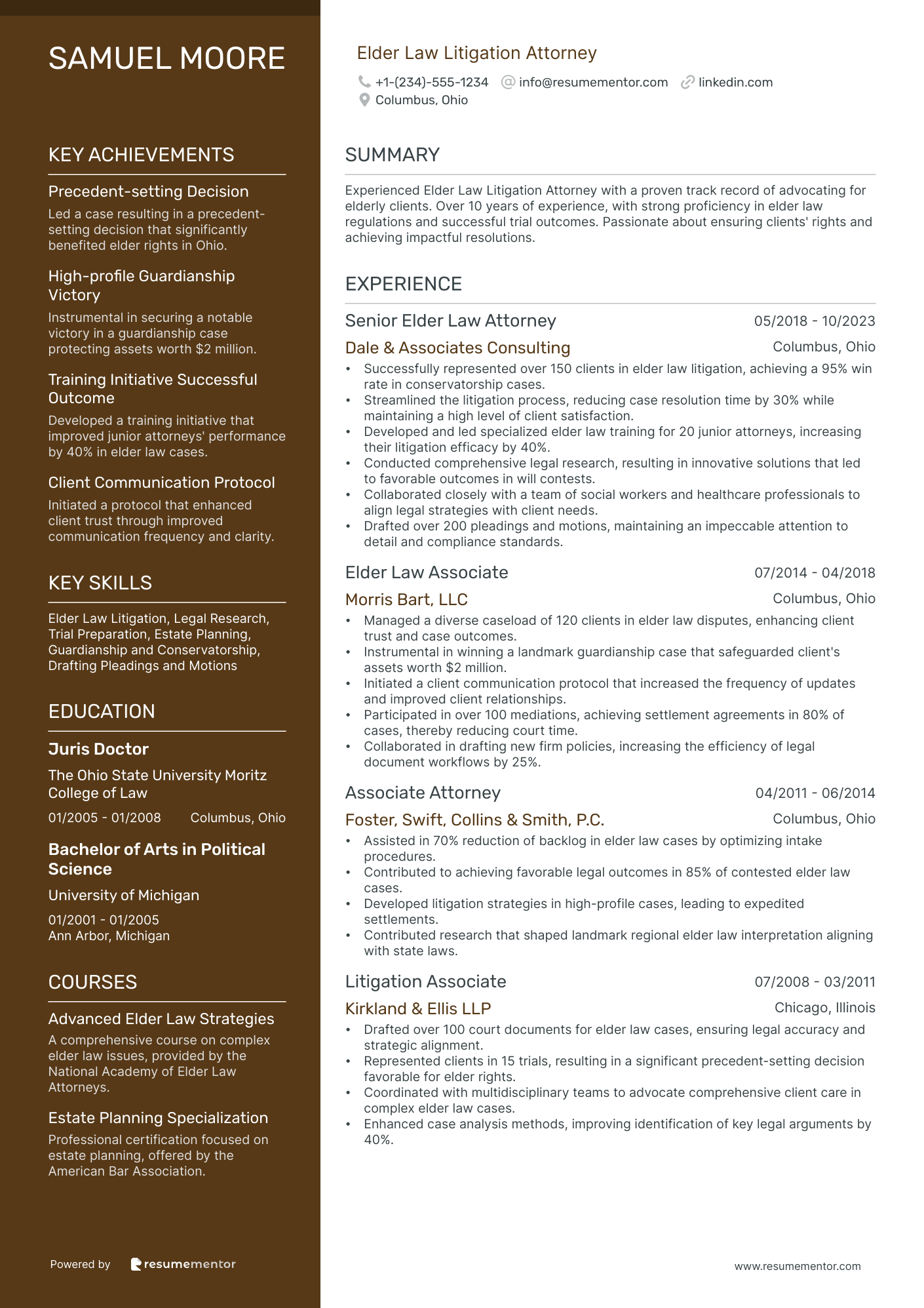
Elder Law Litigation Attorney
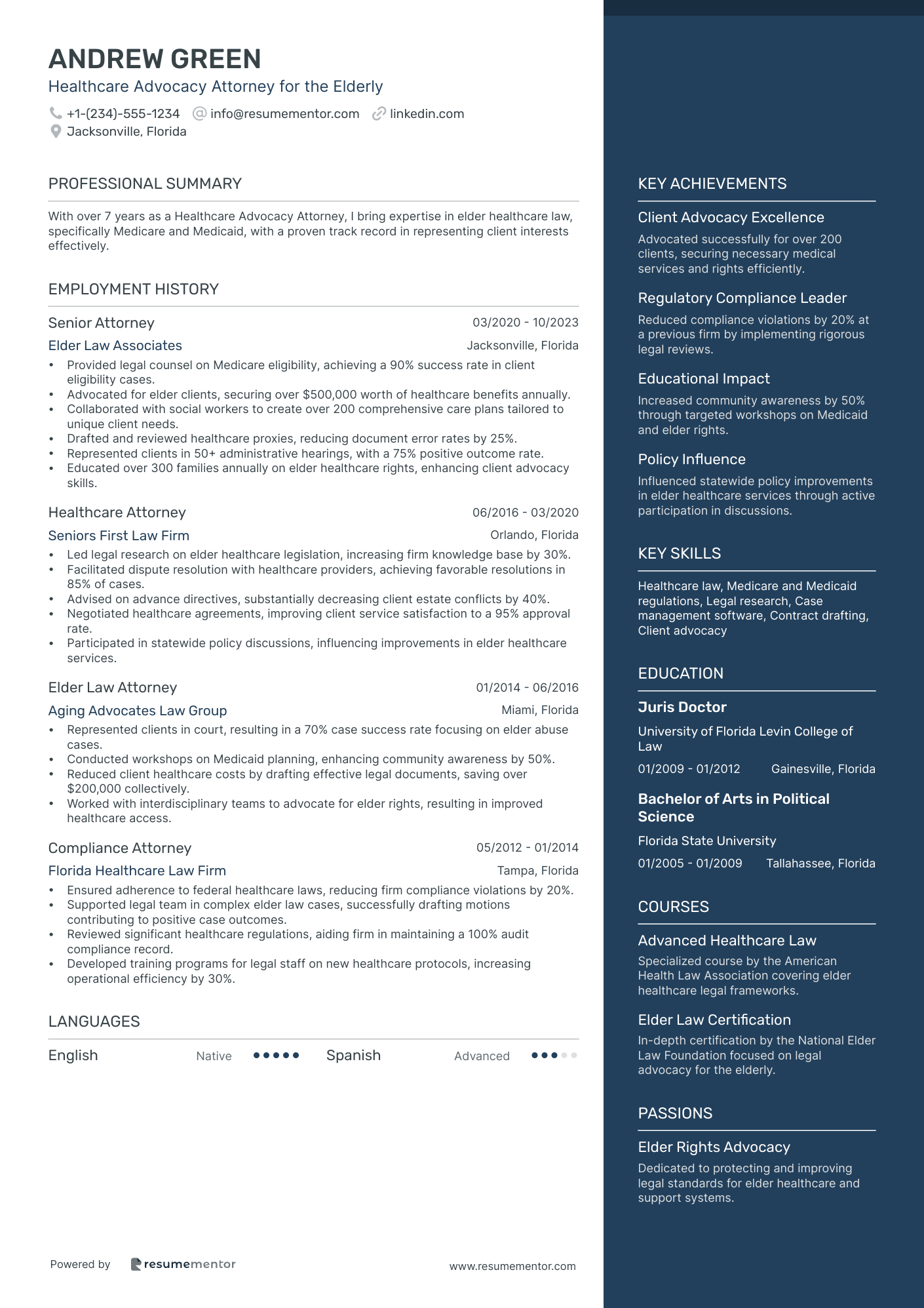
Healthcare Advocacy Attorney for the Elderly
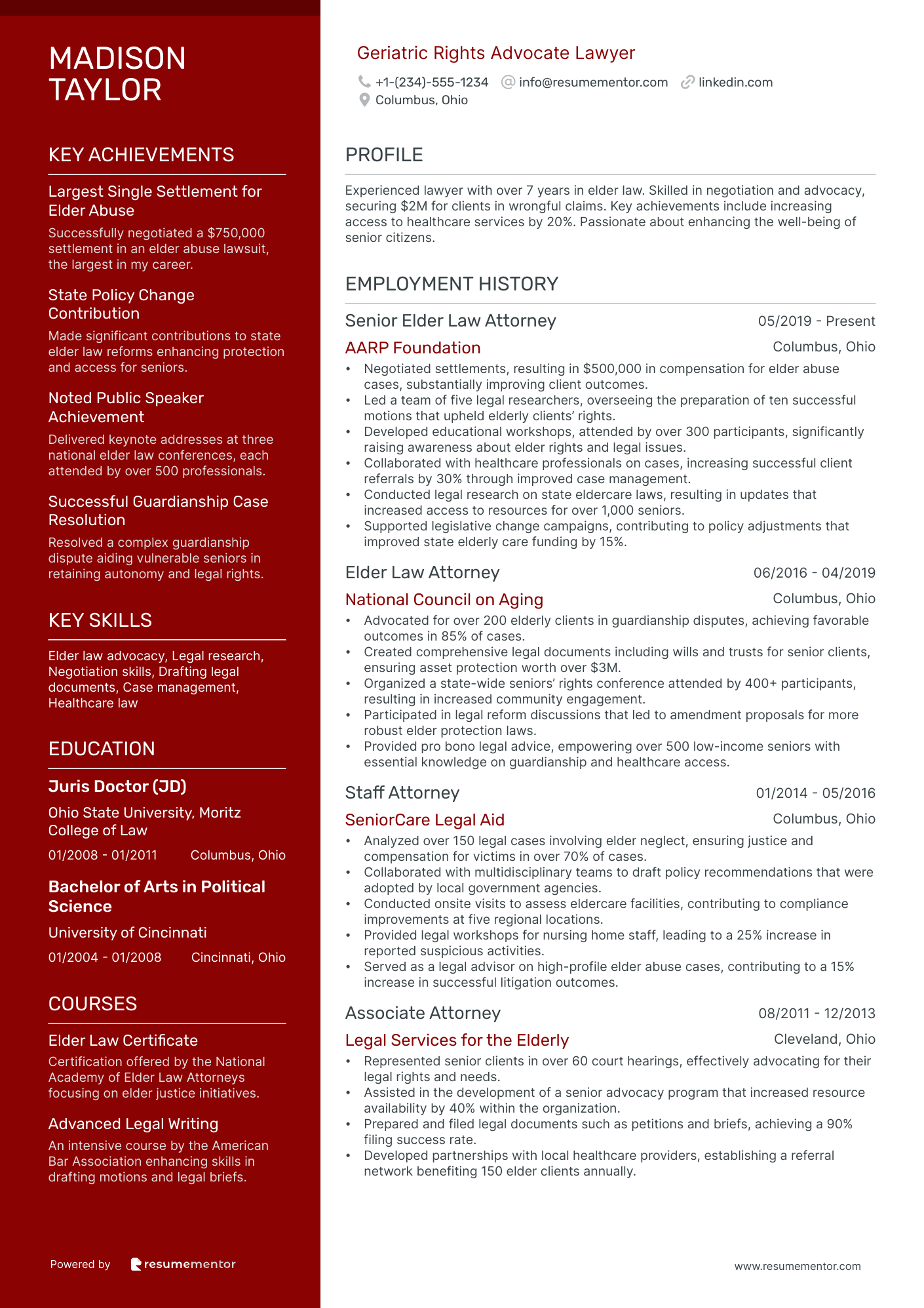
Geriatric Rights Advocate Lawyer
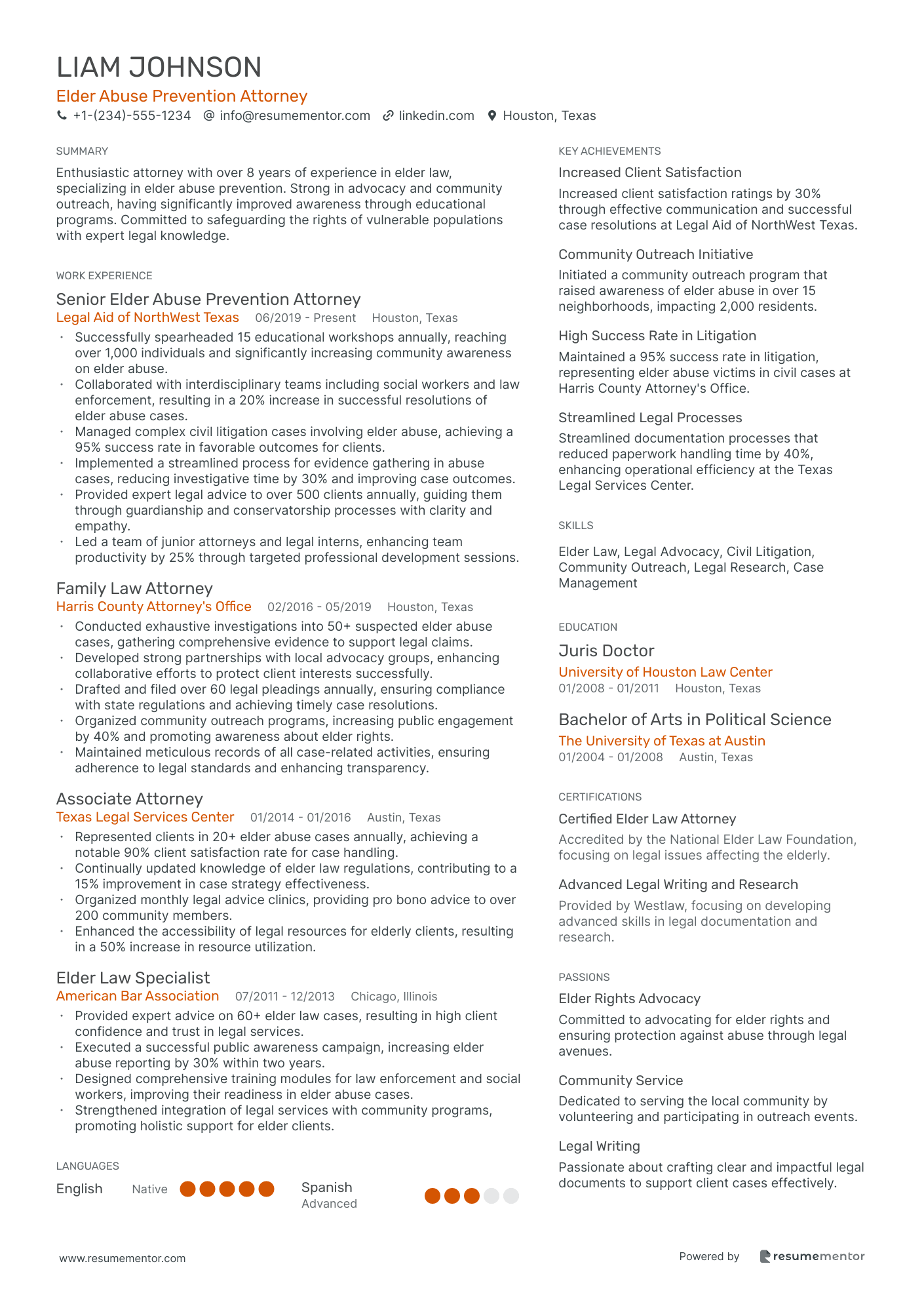
Elder Abuse Prevention Attorney
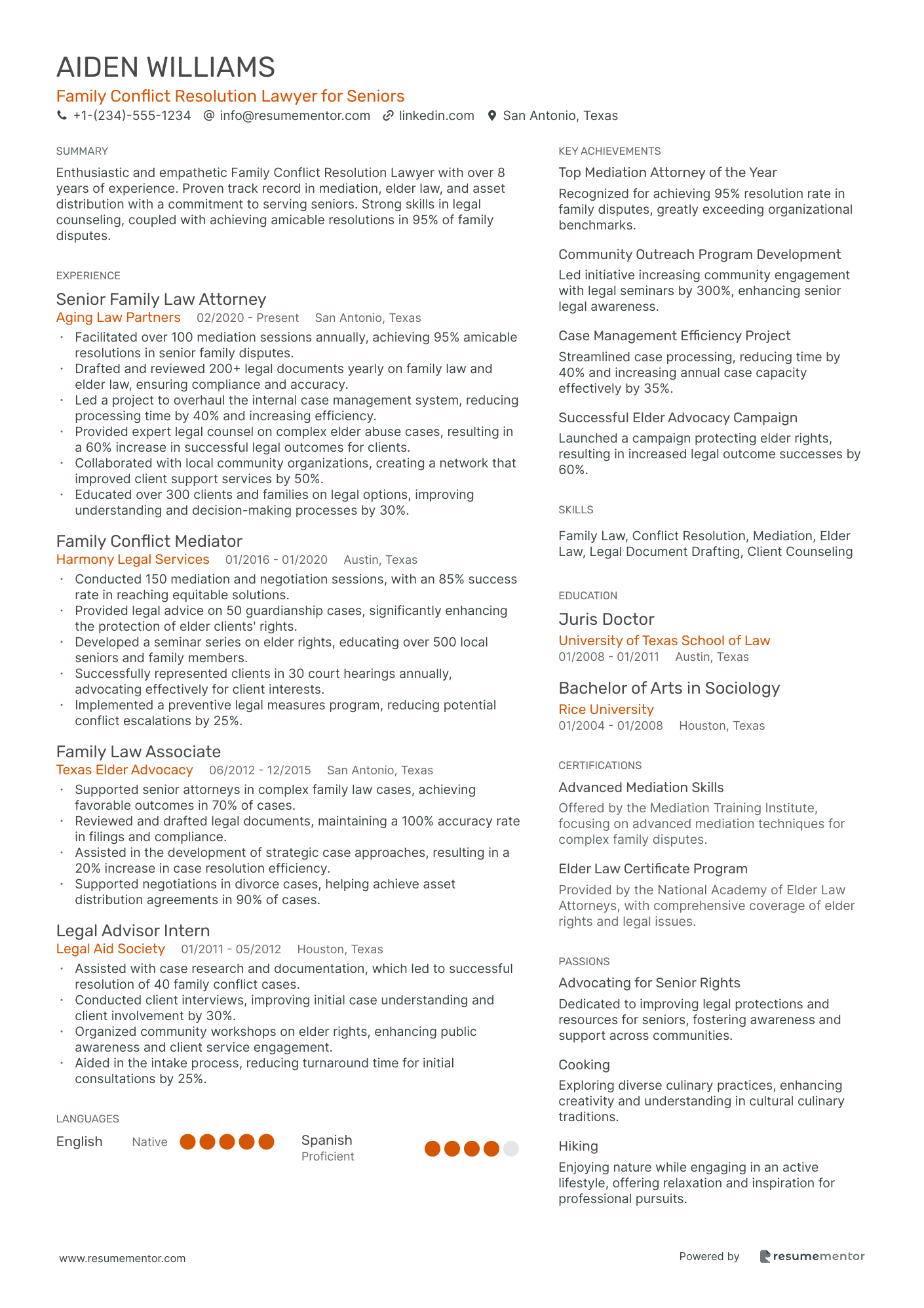
Family Conflict Resolution Lawyer for Seniors
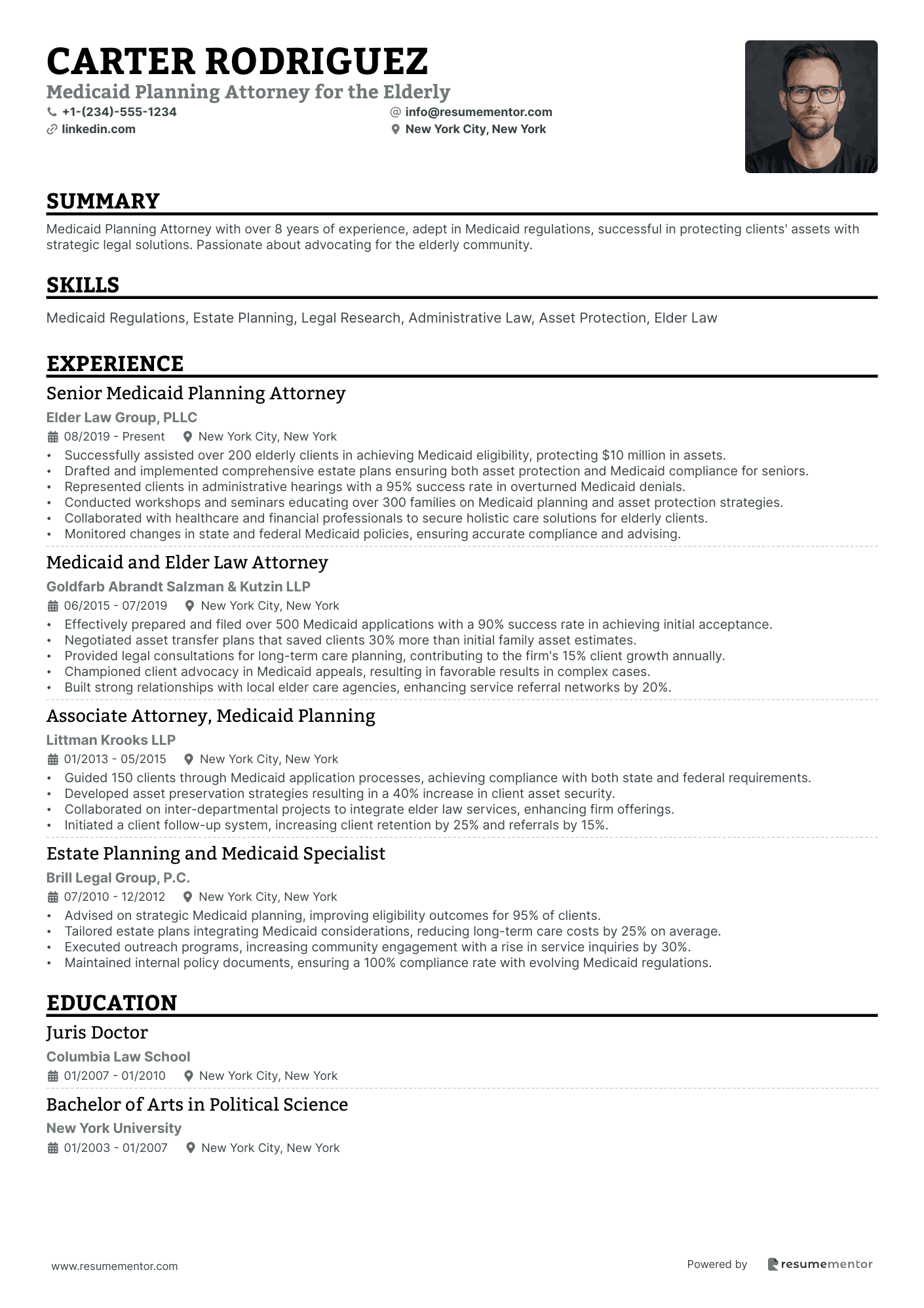
Medicaid Planning Attorney for the Elderly
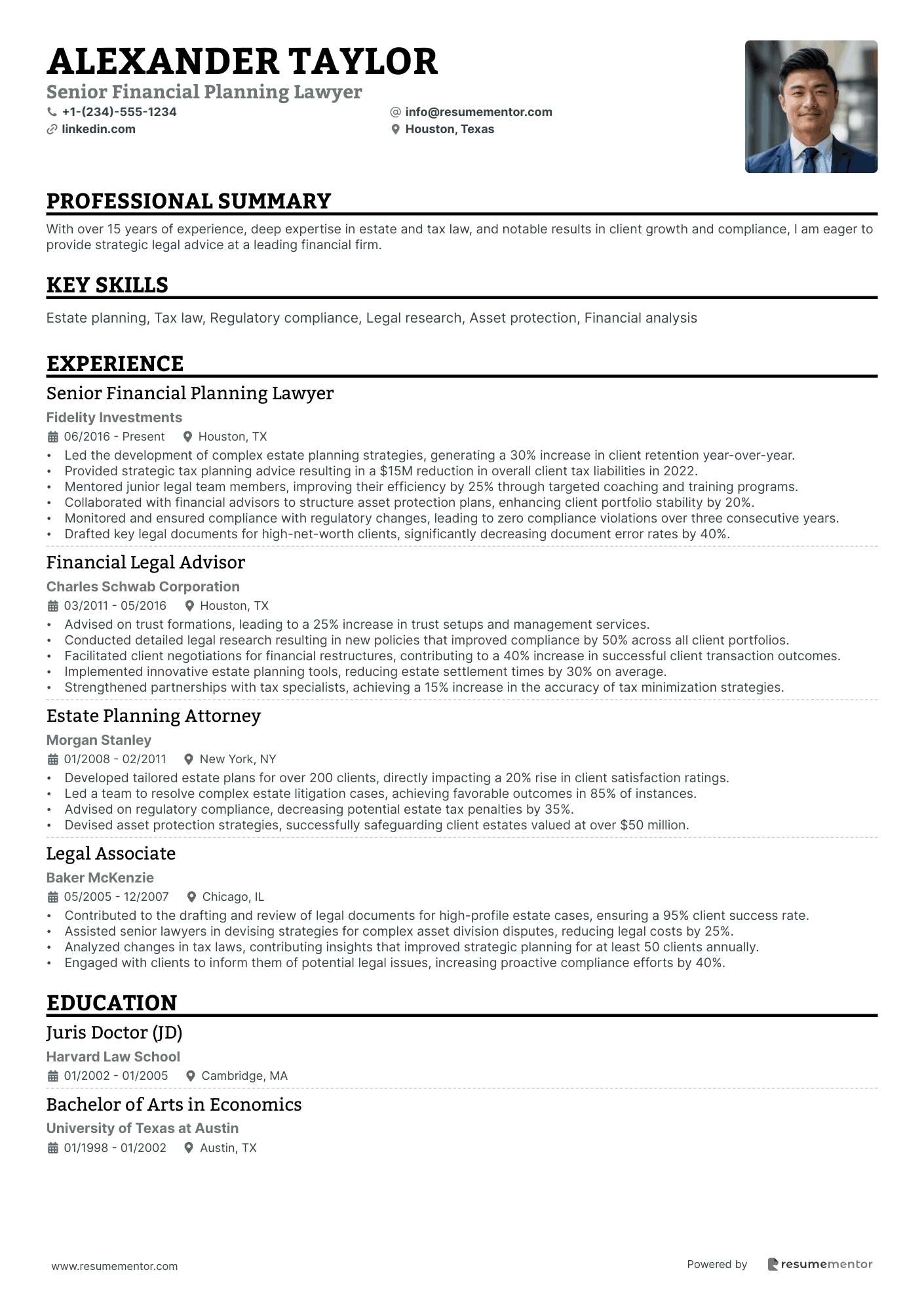
Senior Financial Planning Lawyer
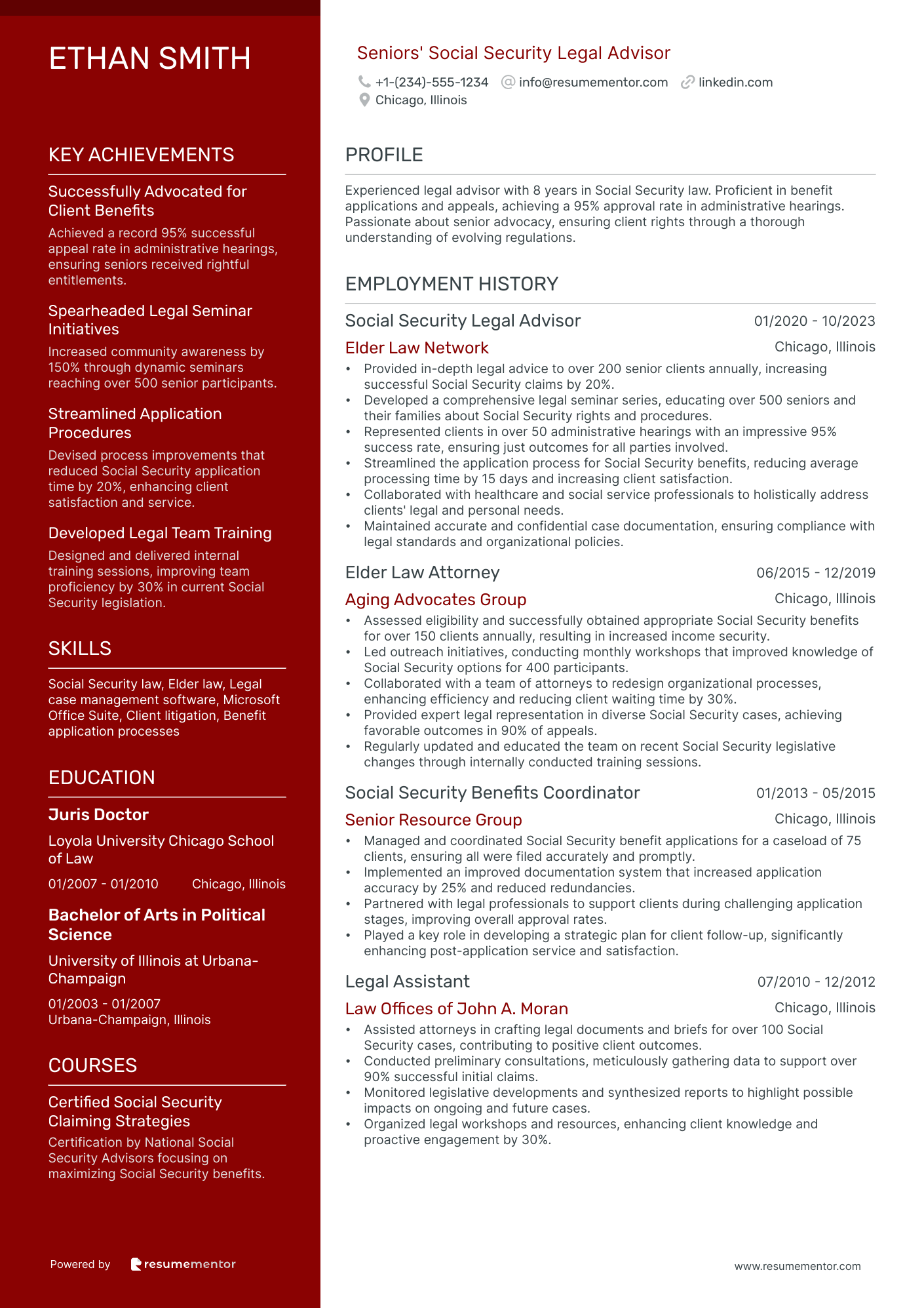
Seniors' Social Security Legal Advisor
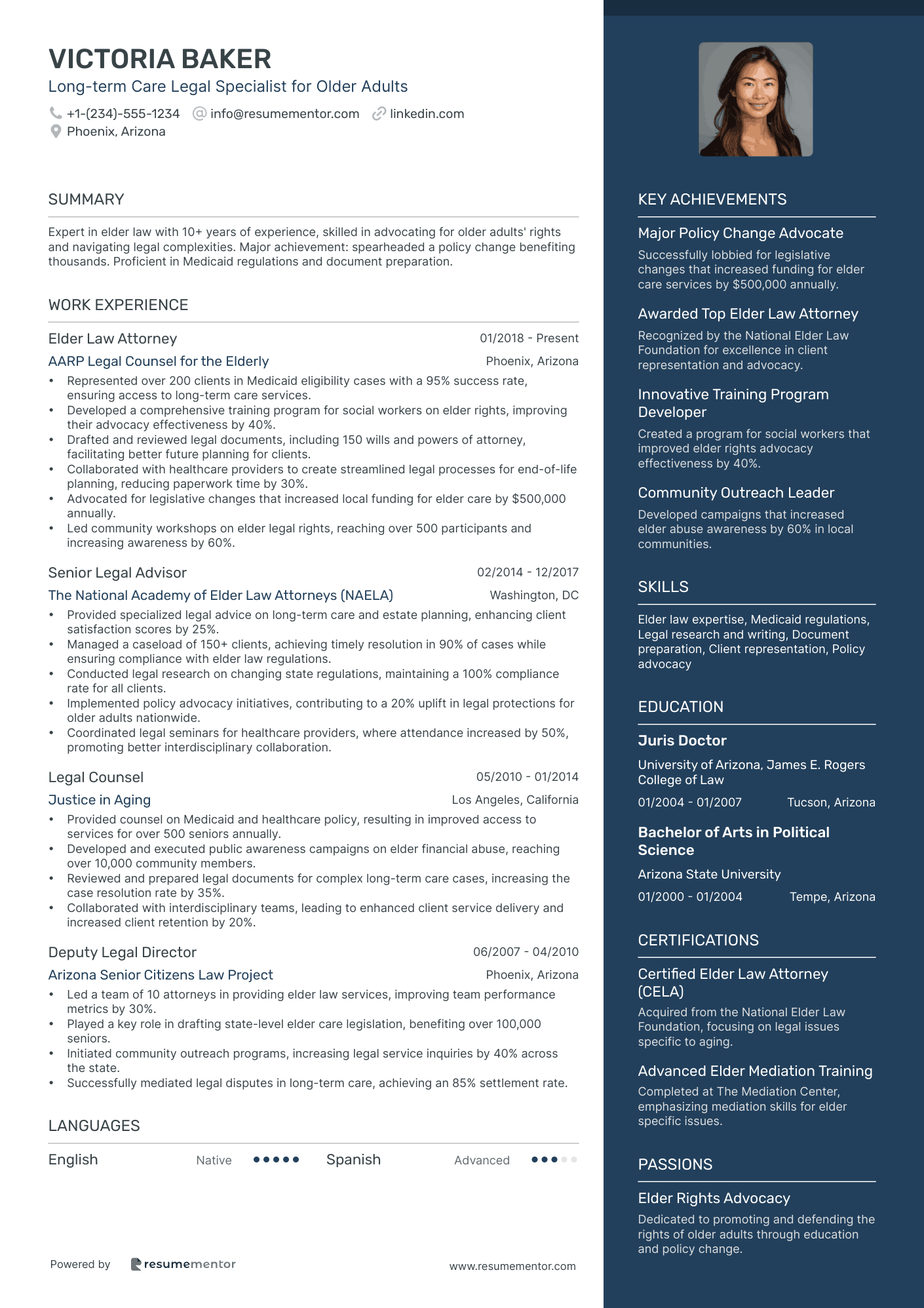
Long-term Care Legal Specialist for Older Adults

Elder Law Litigation Attorney resume sample
- •Successfully represented over 150 clients in elder law litigation, achieving a 95% win rate in conservatorship cases.
- •Streamlined the litigation process, reducing case resolution time by 30% while maintaining a high level of client satisfaction.
- •Developed and led specialized elder law training for 20 junior attorneys, increasing their litigation efficacy by 40%.
- •Conducted comprehensive legal research, resulting in innovative solutions that led to favorable outcomes in will contests.
- •Collaborated closely with a team of social workers and healthcare professionals to align legal strategies with client needs.
- •Drafted over 200 pleadings and motions, maintaining an impeccable attention to detail and compliance standards.
- •Managed a diverse caseload of 120 clients in elder law disputes, enhancing client trust and case outcomes.
- •Instrumental in winning a landmark guardianship case that safeguarded client's assets worth $2 million.
- •Initiated a client communication protocol that increased the frequency of updates and improved client relationships.
- •Participated in over 100 mediations, achieving settlement agreements in 80% of cases, thereby reducing court time.
- •Collaborated in drafting new firm policies, increasing the efficiency of legal document workflows by 25%.
- •Assisted in 70% reduction of backlog in elder law cases by optimizing intake procedures.
- •Contributed to achieving favorable legal outcomes in 85% of contested elder law cases.
- •Developed litigation strategies in high-profile cases, leading to expedited settlements.
- •Contributed research that shaped landmark regional elder law interpretation aligning with state laws.
- •Drafted over 100 court documents for elder law cases, ensuring legal accuracy and strategic alignment.
- •Represented clients in 15 trials, resulting in a significant precedent-setting decision favorable for elder rights.
- •Coordinated with multidisciplinary teams to advocate comprehensive client care in complex elder law cases.
- •Enhanced case analysis methods, improving identification of key legal arguments by 40%.
Healthcare Advocacy Attorney for the Elderly resume sample
- •Provided legal counsel on Medicare eligibility, achieving a 90% success rate in client eligibility cases.
- •Advocated for elder clients, securing over $500,000 worth of healthcare benefits annually.
- •Collaborated with social workers to create over 200 comprehensive care plans tailored to unique client needs.
- •Drafted and reviewed healthcare proxies, reducing document error rates by 25%.
- •Represented clients in 50+ administrative hearings, with a 75% positive outcome rate.
- •Educated over 300 families annually on elder healthcare rights, enhancing client advocacy skills.
- •Led legal research on elder healthcare legislation, increasing firm knowledge base by 30%.
- •Facilitated dispute resolution with healthcare providers, achieving favorable resolutions in 85% of cases.
- •Advised on advance directives, substantially decreasing client estate conflicts by 40%.
- •Negotiated healthcare agreements, improving client service satisfaction to a 95% approval rate.
- •Participated in statewide policy discussions, influencing improvements in elder healthcare services.
- •Represented clients in court, resulting in a 70% case success rate focusing on elder abuse cases.
- •Conducted workshops on Medicaid planning, enhancing community awareness by 50%.
- •Reduced client healthcare costs by drafting effective legal documents, saving over $200,000 collectively.
- •Worked with interdisciplinary teams to advocate for elder rights, resulting in improved healthcare access.
- •Ensured adherence to federal healthcare laws, reducing firm compliance violations by 20%.
- •Supported legal team in complex elder law cases, successfully drafting motions contributing to positive case outcomes.
- •Reviewed significant healthcare regulations, aiding firm in maintaining a 100% audit compliance record.
- •Developed training programs for legal staff on new healthcare protocols, increasing operational efficiency by 30%.
Geriatric Rights Advocate Lawyer resume sample
- •Negotiated settlements, resulting in $500,000 in compensation for elder abuse cases, substantially improving client outcomes.
- •Led a team of five legal researchers, overseeing the preparation of ten successful motions that upheld elderly clients’ rights.
- •Developed educational workshops, attended by over 300 participants, significantly raising awareness about elder rights and legal issues.
- •Collaborated with healthcare professionals on cases, increasing successful client referrals by 30% through improved case management.
- •Conducted legal research on state eldercare laws, resulting in updates that increased access to resources for over 1,000 seniors.
- •Supported legislative change campaigns, contributing to policy adjustments that improved state elderly care funding by 15%.
- •Advocated for over 200 elderly clients in guardianship disputes, achieving favorable outcomes in 85% of cases.
- •Created comprehensive legal documents including wills and trusts for senior clients, ensuring asset protection worth over $3M.
- •Organized a state-wide seniors’ rights conference attended by 400+ participants, resulting in increased community engagement.
- •Participated in legal reform discussions that led to amendment proposals for more robust elder protection laws.
- •Provided pro bono legal advice, empowering over 500 low-income seniors with essential knowledge on guardianship and healthcare access.
- •Analyzed over 150 legal cases involving elder neglect, ensuring justice and compensation for victims in over 70% of cases.
- •Collaborated with multidisciplinary teams to draft policy recommendations that were adopted by local government agencies.
- •Conducted onsite visits to assess eldercare facilities, contributing to compliance improvements at five regional locations.
- •Provided legal workshops for nursing home staff, leading to a 25% increase in reported suspicious activities.
- •Served as a legal advisor on high-profile elder abuse cases, contributing to a 15% increase in successful litigation outcomes.
- •Represented senior clients in over 60 court hearings, effectively advocating for their legal rights and needs.
- •Assisted in the development of a senior advocacy program that increased resource availability by 40% within the organization.
- •Prepared and filed legal documents such as petitions and briefs, achieving a 90% filing success rate.
- •Developed partnerships with local healthcare providers, establishing a referral network benefiting 150 elder clients annually.
Elder Abuse Prevention Attorney resume sample
- •Successfully spearheaded 15 educational workshops annually, reaching over 1,000 individuals and significantly increasing community awareness on elder abuse.
- •Collaborated with interdisciplinary teams including social workers and law enforcement, resulting in a 20% increase in successful resolutions of elder abuse cases.
- •Managed complex civil litigation cases involving elder abuse, achieving a 95% success rate in favorable outcomes for clients.
- •Implemented a streamlined process for evidence gathering in abuse cases, reducing investigative time by 30% and improving case outcomes.
- •Provided expert legal advice to over 500 clients annually, guiding them through guardianship and conservatorship processes with clarity and empathy.
- •Led a team of junior attorneys and legal interns, enhancing team productivity by 25% through targeted professional development sessions.
- •Conducted exhaustive investigations into 50+ suspected elder abuse cases, gathering comprehensive evidence to support legal claims.
- •Developed strong partnerships with local advocacy groups, enhancing collaborative efforts to protect client interests successfully.
- •Drafted and filed over 60 legal pleadings annually, ensuring compliance with state regulations and achieving timely case resolutions.
- •Organized community outreach programs, increasing public engagement by 40% and promoting awareness about elder rights.
- •Maintained meticulous records of all case-related activities, ensuring adherence to legal standards and enhancing transparency.
- •Represented clients in 20+ elder abuse cases annually, achieving a notable 90% client satisfaction rate for case handling.
- •Continually updated knowledge of elder law regulations, contributing to a 15% improvement in case strategy effectiveness.
- •Organized monthly legal advice clinics, providing pro bono advice to over 200 community members.
- •Enhanced the accessibility of legal resources for elderly clients, resulting in a 50% increase in resource utilization.
- •Provided expert advice on 60+ elder law cases, resulting in high client confidence and trust in legal services.
- •Executed a successful public awareness campaign, increasing elder abuse reporting by 30% within two years.
- •Designed comprehensive training modules for law enforcement and social workers, improving their readiness in elder abuse cases.
- •Strengthened integration of legal services with community programs, promoting holistic support for elder clients.
Family Conflict Resolution Lawyer for Seniors resume sample
- •Facilitated over 100 mediation sessions annually, achieving 95% amicable resolutions in senior family disputes.
- •Drafted and reviewed 200+ legal documents yearly on family law and elder law, ensuring compliance and accuracy.
- •Led a project to overhaul the internal case management system, reducing processing time by 40% and increasing efficiency.
- •Provided expert legal counsel on complex elder abuse cases, resulting in a 60% increase in successful legal outcomes for clients.
- •Collaborated with local community organizations, creating a network that improved client support services by 50%.
- •Educated over 300 clients and families on legal options, improving understanding and decision-making processes by 30%.
- •Conducted 150 mediation and negotiation sessions, with an 85% success rate in reaching equitable solutions.
- •Provided legal advice on 50 guardianship cases, significantly enhancing the protection of elder clients' rights.
- •Developed a seminar series on elder rights, educating over 500 local seniors and family members.
- •Successfully represented clients in 30 court hearings annually, advocating effectively for client interests.
- •Implemented a preventive legal measures program, reducing potential conflict escalations by 25%.
- •Supported senior attorneys in complex family law cases, achieving favorable outcomes in 70% of cases.
- •Reviewed and drafted legal documents, maintaining a 100% accuracy rate in filings and compliance.
- •Assisted in the development of strategic case approaches, resulting in a 20% increase in case resolution efficiency.
- •Supported negotiations in divorce cases, helping achieve asset distribution agreements in 90% of cases.
- •Assisted with case research and documentation, which led to successful resolution of 40 family conflict cases.
- •Conducted client interviews, improving initial case understanding and client involvement by 30%.
- •Organized community workshops on elder rights, enhancing public awareness and client service engagement.
- •Aided in the intake process, reducing turnaround time for initial consultations by 25%.
Medicaid Planning Attorney for the Elderly resume sample
- •Successfully assisted over 200 elderly clients in achieving Medicaid eligibility, protecting $10 million in assets.
- •Drafted and implemented comprehensive estate plans ensuring both asset protection and Medicaid compliance for seniors.
- •Represented clients in administrative hearings with a 95% success rate in overturned Medicaid denials.
- •Conducted workshops and seminars educating over 300 families on Medicaid planning and asset protection strategies.
- •Collaborated with healthcare and financial professionals to secure holistic care solutions for elderly clients.
- •Monitored changes in state and federal Medicaid policies, ensuring accurate compliance and advising.
- •Effectively prepared and filed over 500 Medicaid applications with a 90% success rate in achieving initial acceptance.
- •Negotiated asset transfer plans that saved clients 30% more than initial family asset estimates.
- •Provided legal consultations for long-term care planning, contributing to the firm's 15% client growth annually.
- •Championed client advocacy in Medicaid appeals, resulting in favorable results in complex cases.
- •Built strong relationships with local elder care agencies, enhancing service referral networks by 20%.
- •Guided 150 clients through Medicaid application processes, achieving compliance with both state and federal requirements.
- •Developed asset preservation strategies resulting in a 40% increase in client asset security.
- •Collaborated on inter-departmental projects to integrate elder law services, enhancing firm offerings.
- •Initiated a client follow-up system, increasing client retention by 25% and referrals by 15%.
- •Advised on strategic Medicaid planning, improving eligibility outcomes for 95% of clients.
- •Tailored estate plans integrating Medicaid considerations, reducing long-term care costs by 25% on average.
- •Executed outreach programs, increasing community engagement with a rise in service inquiries by 30%.
- •Maintained internal policy documents, ensuring a 100% compliance rate with evolving Medicaid regulations.
Senior Financial Planning Lawyer resume sample
- •Led the development of complex estate planning strategies, generating a 30% increase in client retention year-over-year.
- •Provided strategic tax planning advice resulting in a $15M reduction in overall client tax liabilities in 2022.
- •Mentored junior legal team members, improving their efficiency by 25% through targeted coaching and training programs.
- •Collaborated with financial advisors to structure asset protection plans, enhancing client portfolio stability by 20%.
- •Monitored and ensured compliance with regulatory changes, leading to zero compliance violations over three consecutive years.
- •Drafted key legal documents for high-net-worth clients, significantly decreasing document error rates by 40%.
- •Advised on trust formations, leading to a 25% increase in trust setups and management services.
- •Conducted detailed legal research resulting in new policies that improved compliance by 50% across all client portfolios.
- •Facilitated client negotiations for financial restructures, contributing to a 40% increase in successful client transaction outcomes.
- •Implemented innovative estate planning tools, reducing estate settlement times by 30% on average.
- •Strengthened partnerships with tax specialists, achieving a 15% increase in the accuracy of tax minimization strategies.
- •Developed tailored estate plans for over 200 clients, directly impacting a 20% rise in client satisfaction ratings.
- •Led a team to resolve complex estate litigation cases, achieving favorable outcomes in 85% of instances.
- •Advised on regulatory compliance, decreasing potential estate tax penalties by 35%.
- •Devised asset protection strategies, successfully safeguarding client estates valued at over $50 million.
- •Contributed to the drafting and review of legal documents for high-profile estate cases, ensuring a 95% client success rate.
- •Assisted senior lawyers in devising strategies for complex asset division disputes, reducing legal costs by 25%.
- •Analyzed changes in tax laws, contributing insights that improved strategic planning for at least 50 clients annually.
- •Engaged with clients to inform them of potential legal issues, increasing proactive compliance efforts by 40%.
Seniors' Social Security Legal Advisor resume sample
- •Provided in-depth legal advice to over 200 senior clients annually, increasing successful Social Security claims by 20%.
- •Developed a comprehensive legal seminar series, educating over 500 seniors and their families about Social Security rights and procedures.
- •Represented clients in over 50 administrative hearings with an impressive 95% success rate, ensuring just outcomes for all parties involved.
- •Streamlined the application process for Social Security benefits, reducing average processing time by 15 days and increasing client satisfaction.
- •Collaborated with healthcare and social service professionals to holistically address clients' legal and personal needs.
- •Maintained accurate and confidential case documentation, ensuring compliance with legal standards and organizational policies.
- •Assessed eligibility and successfully obtained appropriate Social Security benefits for over 150 clients annually, resulting in increased income security.
- •Led outreach initiatives, conducting monthly workshops that improved knowledge of Social Security options for 400 participants.
- •Collaborated with a team of attorneys to redesign organizational processes, enhancing efficiency and reducing client waiting time by 30%.
- •Provided expert legal representation in diverse Social Security cases, achieving favorable outcomes in 90% of appeals.
- •Regularly updated and educated the team on recent Social Security legislative changes through internally conducted training sessions.
- •Managed and coordinated Social Security benefit applications for a caseload of 75 clients, ensuring all were filed accurately and promptly.
- •Implemented an improved documentation system that increased application accuracy by 25% and reduced redundancies.
- •Partnered with legal professionals to support clients during challenging application stages, improving overall approval rates.
- •Played a key role in developing a strategic plan for client follow-up, significantly enhancing post-application service and satisfaction.
- •Assisted attorneys in crafting legal documents and briefs for over 100 Social Security cases, contributing to positive client outcomes.
- •Conducted preliminary consultations, meticulously gathering data to support over 90% successful initial claims.
- •Monitored legislative developments and synthesized reports to highlight possible impacts on ongoing and future cases.
- •Organized legal workshops and resources, enhancing client knowledge and proactive engagement by 30%.
Long-term Care Legal Specialist for Older Adults resume sample
- •Represented over 200 clients in Medicaid eligibility cases with a 95% success rate, ensuring access to long-term care services.
- •Developed a comprehensive training program for social workers on elder rights, improving their advocacy effectiveness by 40%.
- •Drafted and reviewed legal documents, including 150 wills and powers of attorney, facilitating better future planning for clients.
- •Collaborated with healthcare providers to create streamlined legal processes for end-of-life planning, reducing paperwork time by 30%.
- •Advocated for legislative changes that increased local funding for elder care by $500,000 annually.
- •Led community workshops on elder legal rights, reaching over 500 participants and increasing awareness by 60%.
- •Provided specialized legal advice on long-term care and estate planning, enhancing client satisfaction scores by 25%.
- •Managed a caseload of 150+ clients, achieving timely resolution in 90% of cases while ensuring compliance with elder law regulations.
- •Conducted legal research on changing state regulations, maintaining a 100% compliance rate for all clients.
- •Implemented policy advocacy initiatives, contributing to a 20% uplift in legal protections for older adults nationwide.
- •Coordinated legal seminars for healthcare providers, where attendance increased by 50%, promoting better interdisciplinary collaboration.
- •Provided counsel on Medicaid and healthcare policy, resulting in improved access to services for over 500 seniors annually.
- •Developed and executed public awareness campaigns on elder financial abuse, reaching over 10,000 community members.
- •Reviewed and prepared legal documents for complex long-term care cases, increasing the case resolution rate by 35%.
- •Collaborated with interdisciplinary teams, leading to enhanced client service delivery and increased client retention by 20%.
- •Led a team of 10 attorneys in providing elder law services, improving team performance metrics by 30%.
- •Played a key role in drafting state-level elder care legislation, benefiting over 100,000 seniors.
- •Initiated community outreach programs, increasing legal service inquiries by 40% across the state.
- •Successfully mediated legal disputes in long-term care, achieving an 85% settlement rate.
As a geriatric lawyer, you bring a wealth of wisdom and experience, yet navigating today’s job market might feel like steering an old ship through modern waters. In this digital age, crafting a resume that reflects your unique skills and accomplishments is crucial. Keeping pace with the legal landscape’s changes can feel challenging, but your expertise in elder law remains your competitive edge. Capturing that expertise on paper is essential for standing out.
When condensing years of experience into a clear, concise document, the task can seem daunting. Yet, those vast achievements become powerful when highlighted with precision. To simplify this process, consider using a resume template. It provides a structured format that allows your abilities to shine through without overwhelming potential employers. Check out these resume templates to streamline your process and create an organized, impactful document.
Instead of being intimidated by new resume trends, see them as tools to highlight your seasoned expertise. Just like guiding clients through complex legal matters, you can use your knowledge to navigate this process. Embrace the challenge of crafting a resume that effectively positions you for future opportunities, ensuring your extensive history supports your aspirations.
Key Takeaways
- The article emphasizes the importance of creating a well-crafted geriatric lawyer resume that highlights your expertise in elder law and showcases your commitment to serving the elderly community.
- Ensure your resume includes a prominent section for contact information, a professional summary that highlights your specialized elder law skills, and detailed work experience that reflects your impact in the field.
- Choose a chronological format for your resume to help employers easily trace your career progression, and use modern fonts and a PDF format to maintain professionalism and consistency.
- Include sections for skills, education, and relevant certifications, focusing on both hard skills like estate planning and soft skills like empathy and communication to align with keywords that catch hiring managers' attention.
- Enhance your resume with extra sections for languages, hobbies, volunteer work, or publications, demonstrating your well-rounded personality and dedication to geriatric law.
What to focus on when writing your geriatric lawyer resume
A well-crafted geriatric lawyer resume should effectively convey your expertise in elder law, underscoring your commitment to serving the elderly community—showcasing your proficiency in dealing with legal issues like estate planning, long-term care, and guardianship. This approach reassures recruiters of your compassion and effectiveness in navigating the sensitive challenges faced by seniors in legal contexts. Each section of your resume is vital to demonstrate your professional journey and skill set.
How to structure your geriatric lawyer resume
- Contact Information—Ensure your full name, phone number, email address, and LinkedIn profile are prominently displayed. This ensures recruiters can easily contact you and view your professional background online. This information is critical as it sets the stage for your initial impression.
- Professional Summary—Crafting an overview that emphasizes your extensive elder law experience is key. Highlight your specialized skills, especially your knowledge of Medicaid and Medicare, as these are central to geriatric law. This summary introduces you and sets the tone for the rest of your resume.
- Work Experience—Detailing your legal roles can set you apart. Emphasize specific geriatric law cases you've managed, mediated successfully, and any positive client feedback, highlighting your real-world impact and expertise. This section is where you can truly showcase how your experience aligns with the needs of the role.
- Education—List your law degree and certifications related to elder law, such as a Certified Elder Law Attorney (CELA) designation, showcasing your commitment to staying educated and qualified in your field. Highlight ongoing learning as it reflects your dedication to growth and effectiveness.
- Skills—Familiarity with elder abuse laws, estate planning, and strategies for preventing elder financial exploitation positions you as a comprehensive professional in your field. Demonstrating these skills shows your ability to address diverse aspects of elder law effectively.
- Professional Associations—Highlight memberships in organizations like the National Academy of Elder Law Attorneys. Active involvement shows a commitment to staying current and engaged with industry trends and peer networks. These connections help reinforce your credibility and dedication to the profession.
Each section of your resume contributes to a cohesive narrative of your expertise and commitment to elder law. Below, we'll cover each section more in-depth, ensuring you can present yourself as the ideal candidate for a geriatric lawyer position.
Which resume format to choose
When writing a resume as a geriatric lawyer, it’s crucial to choose a format that highlights your strengths. The chronological format serves this purpose well, as it allows potential employers to trace your career journey easily. This is especially important in the legal field, where experience and career progression reflect your expertise and reliability.
In terms of font choice, opting for modern options like Rubik, Lato, or Montserrat ensures that your resume stands out while remaining professional. These fonts give your document a fresh, updated appearance, helping convey an image of someone who is both seasoned in their field and attuned to contemporary standards.
Saving your resume as a PDF is essential. This format locks in your layout and design, preventing any accidental changes when it's viewed on different devices. This consistency in presentation underscores the meticulous nature expected of a legal professional.
Finally, maintaining margin sizes between 0.5 and 1 inch on all sides not only enhances readability but also makes sure your content isn't overcrowded. This clean presentation helps your skills and achievements take center stage, making it easier for hiring managers to appreciate the depth of your experience.
How to write a quantifiable resume experience section
The experience section of your geriatric lawyer resume is crucial as it tells the story of your professional journey. Start by listing your most recent job first so employers see your latest skills front and center. Focus on your work in elder law, highlighting areas like estate planning, elder abuse, or long-term healthcare, which demonstrate your specialized expertise. Tailor this section to each job by matching your descriptions with the skills or experiences the employer seeks. Use impactful action words like "advocated," "negotiated," or "implemented" to show your achievements, making sure they’re backed by measurable results to illustrate your value effectively. Limiting your history to 10-15 years keeps your resume relevant unless earlier roles are significant to geriatric law. Include job titles that directly relate to elder law or roles that provided essential skills, showing a clear and relevant career path.
- •Secured over $2 million in benefits for senior clients by navigating complex Social Security Administration processes.
- •Led a team in drafting and implementing advanced care directives, increasing client satisfaction by 30%.
- •Negotiated and resolved 200+ elder abuse cases with a settlement success rate of 95%.
- •Implemented new estate planning strategies, reducing clients' tax liabilities by 40%.
Your experience section stands out by seamlessly aligning your expertise with employer needs, connecting your achievements to their desired outcomes. By including specific accomplishments backed by measurable results, you not only showcase your impact but also highlight your leadership potential. Each bullet point is crafted to enhance your focus on elder law, underscoring your commitment and specialization in this field. This approach is tailored to present you as an invaluable asset, effectively demonstrating your ability to deliver results in roles that emphasize elder care legal issues.
Project-Focused resume experience section
A project-focused geriatric lawyer resume experience section should clearly display your expertise in handling legal matters that impact older adults. Start by showcasing your specialized knowledge in areas like estate planning, elder abuse, or healthcare directives, emphasizing how you've successfully managed related cases or projects. Highlight achievements and results that demonstrate your ability to navigate the complexities of elder law, ensuring each accomplishment reflects your dedication to serving this unique client base.
When detailing your experience, describe the projects or cases you’ve handled, clearly stating your role and the impact of your work. Use strong action verbs and relevant metrics to illustrate your skills and successes. Each bullet point should connect to the next by highlighting a specific success or area of expertise, making it relevant to potential clients or employers in the geriatric legal field. Let your resume entries seamlessly reflect your commitment to advocating for the rights and needs of aging individuals.
Geriatric Lawyer
Elder Law Advocacy Group
Jan 2020 - Present
- Managed complex estate planning for over 50 clients, ensuring compliance with state laws.
- Successfully defended clients in elder abuse cases, achieving favorable outcomes in 90% of cases.
- Collaborated with healthcare professionals to advise on legal issues surrounding patient rights and healthcare directives.
- Presented seminars to educate seniors and their families on legal protections and available resources.
Collaboration-Focused resume experience section
A collaboration-focused geriatric lawyer resume experience section should weave together your teamwork skills and client-centered approach. Begin by sharing stories where you joined forces with other professionals, like healthcare providers, to design comprehensive care plans for elderly clients. These examples should highlight your ability to communicate effectively, leading meetings, organizing client workshops, and resolving disputes. By connecting these elements, you can clearly demonstrate how your efforts have significantly improved client satisfaction and case outcomes.
Think of your past work experiences as continuous chapters of collaboration and unity. Illustrate how you played a vital role in negotiations, contributed to multidisciplinary projects, and actively resolved conflicts. It’s essential to emphasize how these experiences helped you align with both your team’s and clients’ objectives. Through well-defined bullet points, you can seamlessly convey how your collaborative skills have been integral to your success and growth as a geriatric lawyer.
Geriatric Lawyer
Elder Law Associates, Inc.
May 2018 - Present
- Worked alongside healthcare professionals to create and roll out care plans for over 100 elderly clients, boosting client satisfaction by 30%.
- Conducted bi-weekly meetings with diverse teams to ensure thorough case analyses and tailor legal solutions to clients’ needs.
- Organized and led workshops for clients on legal matters related to elder care, increasing community knowledge and involvement.
- Facilitated resolution of disputes among families and care providers, achieving a 95% success rate and building lasting relationships.
Skills-Focused resume experience section
A skills-focused geriatric lawyer resume experience section should emphasize your strengths and achievements in elder law. Begin with experiences that clearly demonstrate your ability to assist elderly clients effectively. Address how you've managed cases, advocated for clients' rights, and drafted essential legal documents, making sure to highlight any notable successes. This will underscore your skills and the positive impact you've had on your clients' lives, setting you apart as an expert in this field.
As you craft this section, use clear and direct language that showcases your skills with confidence. Begin each bullet point with a strong action verb to highlight your accomplishments, and incorporate specific examples with tangible outcomes. This approach not only illustrates your extensive experience but also evidences your effectiveness as a lawyer specializing in elder law, helping to communicate the value you bring to your clients.
Geriatric Lawyer
ElderCare Legal Services
June 2018 - Present
- Successfully negotiated settlements in over 50 elder law cases, achieving a 95% satisfaction rate from clients.
- Developed comprehensive estate plans to protect assets and ensure proper distribution for over 100 clients.
- Conducted community workshops on elder rights, educating over 500 seniors and their families on legal protections.
- Drafted and implemented advanced healthcare directives, ensuring clear medical intentions for client families.
Growth-Focused resume experience section
A growth-focused resume experience section for a geriatric lawyer should showcase your dedication to client advocacy and your problem-solving abilities, highlighting your significant contributions to both client success and the growth of your law firm. Start by vividly illustrating how your efforts have resulted in tangible improvements for your clients, whether through successful case outcomes or enhanced client satisfaction. Use action-oriented language to convey the impact of your work, ensuring that each sentence builds upon the last. Highlight specific cases, client-focused initiatives, or policy developments that demonstrate your expertise in elder law, emphasizing your continuous drive for achieving positive results.
Connect the dots by showcasing a consistent track record of exceptional service that has led to improved outcomes for seniors and their families. Describe the instances where your work made a significant difference, impacting both the lives of your clients and the broader objectives of your firm. Including specifics, like numbers or percentages, can lend credibility and clarity to your accomplishments. This approach allows the reader to fully appreciate your unique skills—not only as a lawyer who understands the complexities of elder law but also as someone profoundly committed to the well-being of the older generation.
Senior Attorney
Elder Rights Law Firm
Jan 2020 - Present
- Boosted client satisfaction by 30% with a new comprehensive feedback system.
- Led 15 high-profile elder law cases, achieving favorable outcomes in over 90% of them.
- Started a community outreach program that educated over 500 seniors on their legal rights.
- Created a streamlined process for power of attorney documentation, cutting processing time by 25%.
Write your geriatric lawyer resume summary section
A geriatric-focused lawyer resume summary should effectively highlight your strengths and specialized experience in the field. When you have substantial experience, using a summary rather than an objective allows you to showcase your skills and accomplishments. Start by presenting yourself as a seasoned professional, emphasizing both the length of your career and your areas of expertise. It’s important to include achievements that clearly demonstrate your value to potential employers, using straightforward language to ensure clarity.
Describing yourself effectively in your summary means selecting words that reflect your personality while maintaining professionalism. In geriatric law, it’s crucial to convey empathy, advocacy, and legal expertise through your word choices. Infuse your description with a sense of kindness and dedication, illustrating how you build relationships with clients.
Understanding the distinctions between resume components is also vital. A resume summary provides a quick overview of your experience, skills, and accomplishments. This contrasts with a resume objective, which sets out your goals in the role you’re applying for. A resume profile might blend these elements, adding a narrative touch to your professional identity, while a summary of qualifications uses bullet points to list skills and achievements.
In this example, your years of experience and valuable skills are front and center, particularly in vital areas of geriatric law. The summary conveys a combination of compassion and expertise, focusing on specialized skills. By highlighting negotiation and advocacy capacities, you provide insight into your professional approach and commitment. This approach excellently captures what makes you a unique and valuable candidate.
Listing your geriatric lawyer skills on your resume
A skills-focused resume for a geriatric lawyer should effectively highlight your key qualifications. You can feature your skills as a standalone section or weave them into other parts like your experience and summary. Your strengths and soft skills showcase your interpersonal abilities, emphasizing traits like empathy and communication that are crucial when working with elderly clients. Hard skills, on the other hand, represent teachable and measurable abilities, such as legal research and elder law expertise. By combining both hard and soft skills, you align your resume with keywords that catch a hiring manager’s attention, increasing your chances of securing an interview.
Crafting a standalone skills section allows you to highlight the most relevant abilities efficiently. For a geriatric lawyer, it's essential to tailor these skills to showcase your expertise in elder law and your capacity for building strong client relationships. Here's how to format a skills section in JSON:
This well-organized section effectively highlights skills that are relevant to your field, allowing potential employers to quickly see your qualifications.
Best hard skills to feature on your geriatric lawyer resume
Hard skills illustrate your technical and practical abilities in the field. They show your capability to navigate complex legal systems and tackle specific challenges that elderly clients face.
Hard Skills
- Elder Law Expertise
- Advanced Legal Research
- Estate and Will Drafting
- Trust Administration
- Tax Planning for Seniors
- Benefits Analysis (Medicare/Medicaid)
- Geriatric Guardianship
- Litigation Preparation
- Healthcare Law
- Compliance and Regulations
- Advocacy Strategies
- Ethical Judgment
- Intellectual Property Law for Elders
- Contract Negotiation
- Real Estate Law
Best soft skills to feature on your geriatric lawyer resume
As a geriatric lawyer, soft skills should highlight your empathy, clear communication, and patience, demonstrating your ability to provide effective support to your clients.
Soft Skills
- Empathy
- Communication Skills
- Patience
- Problem-Solving
- Time Management
- Decision-Making
- Emotional Intelligence
- Client Relationship Management
- Adaptability
- Active Listening
- Team Collaboration
- Cultural Competence
- Conflict Resolution
- Attention to Detail
- Trustworthiness
How to include your education on your resume
The education section is a crucial part of your resume, especially when applying for a specialized role like a geriatric lawyer. It showcases your relevant academic background and can set you apart from other candidates. Tailoring it to the job is essential. Including only relevant education helps keep the focus sharp and avoids cluttering the section with unrelated details. When adding a GPA, it's best to include it if it's above 3.0, as this reflects positively on your academic performance. Mentioning honors, such as cum laude, adds value to your credentials, so include it when applicable. For listing a degree, always use the full title followed by the institution's name and your graduation date.
- •Member of the university choir
The second example shines because it focuses solely on the relevant qualifications for a geriatric lawyer. The Juris Doctor degree is pertinent to the legal field, and listing it with honors such as cum laude shows academic excellence. The GPA of 3.7 reinforces this, highlighting strong academic performance. Excluding the location emphasizes what matters most: the degree and honors. This streamlined approach enhances clarity and ensures the educational background aligns with the desired role.
How to include geriatric lawyer certificates on your resume
Including a certificates section in your geriatric lawyer resume is crucial for showcasing specialized skills. You can even feature key certificates in the header for immediate visibility.
List the name of the certificate clearly. Include the date of issuance to indicate recentness. Add the issuing organization to establish credibility. A good example in the header would be:
"Certified Elder Law Attorney (CELA), National Elder Law Foundation, 2021."
Here’s a detailed example of a standalone certificates section:
The above example effectively displays specialization. The CELA certification is highly relevant and respected. VA Accreditation shows ability to assist veterans. The Guardianship Law certificate adds another layer of expertise. This makes you stand out in the field of elder law and demonstrates a deep commitment to your specialization.
Extra sections to include in your geriatric lawyer resume
Crafting a strong resume as a geriatric lawyer involves more than just listing your work history and education. Highlighting your unique skills and experiences can greatly influence how potential employers perceive you.
Language section — Show a command of multiple languages to emphasize your ability to serve diverse elderly clients. Include details of proficiency levels.
Hobbies and interests section — Share hobbies to show a well-rounded personality. Include activities that demonstrate patience and empathy.
Volunteer work section — Mention volunteer gigs to illustrate your commitment to the elderly community. Emphasize roles that involved legal advice or support.
Books section — List relevant legal books or articles you have written to show expertise. Cite publications that focus on elder law or ethics.
Adding these sections can make your resume stand out and convey your dedication to geriatric law.
In Conclusion
In conclusion, as an experienced geriatric lawyer, navigating the modern job market requires a well-crafted resume that reflects both your expertise and your adaptability to evolving trends. Highlighting your extensive background in elder law not only showcases your commitment but also positions you as a valuable asset. Your resume should emphasize key accomplishments that demonstrate your skills in handling the complex issues older adults face, such as estate planning and elder abuse prevention. Utilizing clear and structured resume formats with modern fonts keeps your document professional and engaging. Each element, from your education to specialized certificates like the Certified Elder Law Attorney designation, contributes to portraying your comprehensive understanding of geriatric law. Remember, placing measurable outcomes and specific achievements at the forefront displays your capability to potential employers. A focused skills section, including both hard and soft skills, further underscores your strengths. Don't underestimate the value of extra sections like volunteer work, which highlight your dedication to the community. By knitting together these aspects, your resume not only narrates your professional journey but also reaffirms your suitability for roles in this specialized field, ensuring that hiring managers recognize your unique contributions and commitment to elder law.
Related Articles

Continue Reading
Check more recommended readings to get the job of your dreams.
Resume
Resources
Tools
© 2026. All rights reserved.
Made with love by people who care.

